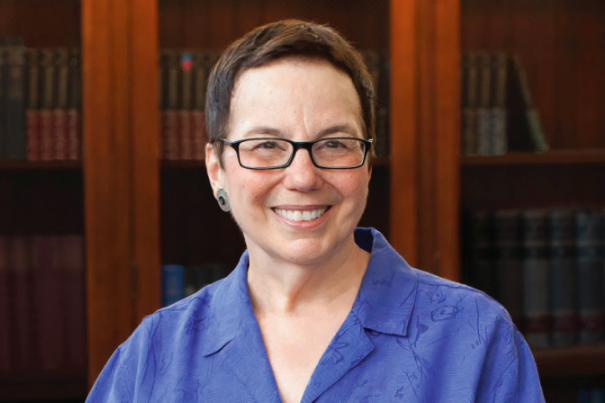The new dean of library, Harriette Hemmasi has been working in and around libraries for nearly her entire career, but her first love was music.
“I loved being around all the music books,” Hemmasi said. “I also realized how critical being able to use the library and being able to understand what was in the library was so important to my ability to succeed as a student, especially as a music student, because at that time you had to actually go to the library to listen to recordings, to look at scores, and all that kind of stuff.”
Hemmasi, having formerly worked at Brown University, is taking the role following the retirement of Artemis Kirk, the former Georgetown dean of the library of 16 years. She studied music at Indiana University, Bloomington and Baylor University, earning master’s and bachelor’s degrees, respectively. Her first job out of college was as a music librarian at Rutgers, and she later taught music at a university in Iran. She then attended the University of California, UC Berkeley for graduate school, where she earned her degree in library studies, specifically in library and information science.
It was the combination of education and music that brought her closer to libraries.
“When I was a child, you know quite young, I actually had trouble learning things,” Hemmasi said. A turning point was taking piano lessons as a 10-year-old; the one-on-one interaction with her instruction helped her realize that learning could come naturally to her.
“Music was transformative for me; taking lessons and being focused, it made me see myself differently, which was really essential.”
She was originally drawn to the profession by the books, but one of her favorite parts of being a librarian now is the role of technology, a part of library science which has changed dramatically since she became a librarian in 1989.
“I love the way in which technology has really made the library something entirely different than it was,” she said. At Brown, for instance, one of her favorite pieces of technology was a 16-foot tall interactive video wall, which she said helped draw students to the library. But technology is a functional part of libraries, not just an attraction.
“It’s not just that technology is changing libraries,” she said. “It’s changed the way research is done, how teaching is done, how we interact with information, and even interact with each other.”
***
Now, Hemmasi’s target for improvement is Lauinger, which she believes is in need of an upgrade. “The library needs a major facelift,” Hemmasi said. “And I think the university is well aware of that and wants that to happen.”
Though she has only been on campus in her new role for less than a month, she is well aware of the complaints about Georgetown’s main library.
“It’s not a welcoming place, and it really ought to be more comfortable, more functional, and just generally more inviting,” she said. “It certainly has the potential, and I’ve done a lot of work in other places on improving the library environment, programs, services, and so on, and I really hope that is something that can happen here. I more than hope, I’m committed to that.”
When Hemmasi was appointed the Joukowsky Family University Librarian at Brown in 2005, she was responsible for overhauling the university library system. The first step was to fundraise.
“When I went to Brown the libraries were in dire need of upgrading, not unlike here, and it took some time to do that, to get buy-in on campus, of course to get money, and make the plans,” she said.
Hemmasi’s fundraising efforts at Brown will be put to the test at Georgetown, which has recently cut funding for its libraries.
“There’s always a need for more money,” she said. And especially if we want to do capital work and improvements to library spaces, we will definitely need external funding and support from alumni and other sources. So the answer to, ‘Will I be looking to raise more money?’ You bet. That has to happen.”
And she already has tangible goals. She is focused on implementing new programming, interior remodeling, and increasing library connections with the greater D.C. community, among other plans.
“How might the library space change? Not just pretty furniture but really making it more useful and more dedicated to the emerging and evolving needs of the campus,” she said. “What will be the program and how will that be designed?”
Beyond reimagining Georgetown’s system, Hemassi is looking to expand the library’s connection to other institutions across the District.
“One of the big changes for not just academic libraries but also for higher education in general, is how we relate to other institutions of higher ed and also other scholarly institutions and cultural institutions, what we can learn from them and [try to] take advantage of what exists elsewhere,” Hemmasi said. “And that’s particularly important in this very rich cultural and scholarly environment in the D.C. area. So, you know, figuring out what’s here, and then figuring out what is around us, and how to maximize those two things and blend them.”
Hemmasi envisions the library as a place where students are able to come to study, but also to hang out with friends and spend time without dreading coming to the library, a “blended approach to campus life.”
“It shouldn’t be punishment to come here,” Hemmasi said. “They should want to come.”
Hemmasi comes to Georgetown with a depth of knowledge and experience. She was able to talk about all things library related.
Well, almost everything.
When it came to talking about books, Hemmasi was stumped. Asked what her favorite book is, she responded, “Oh, I don’t know…I suppose I’m supposed to have an answer.”



